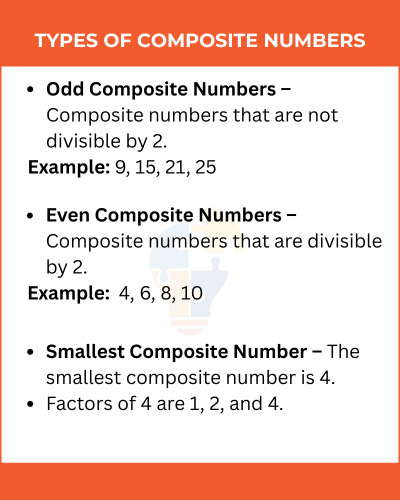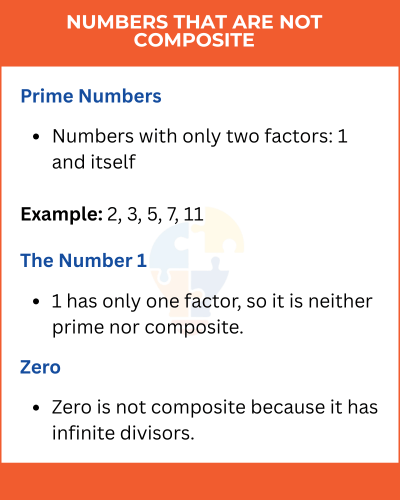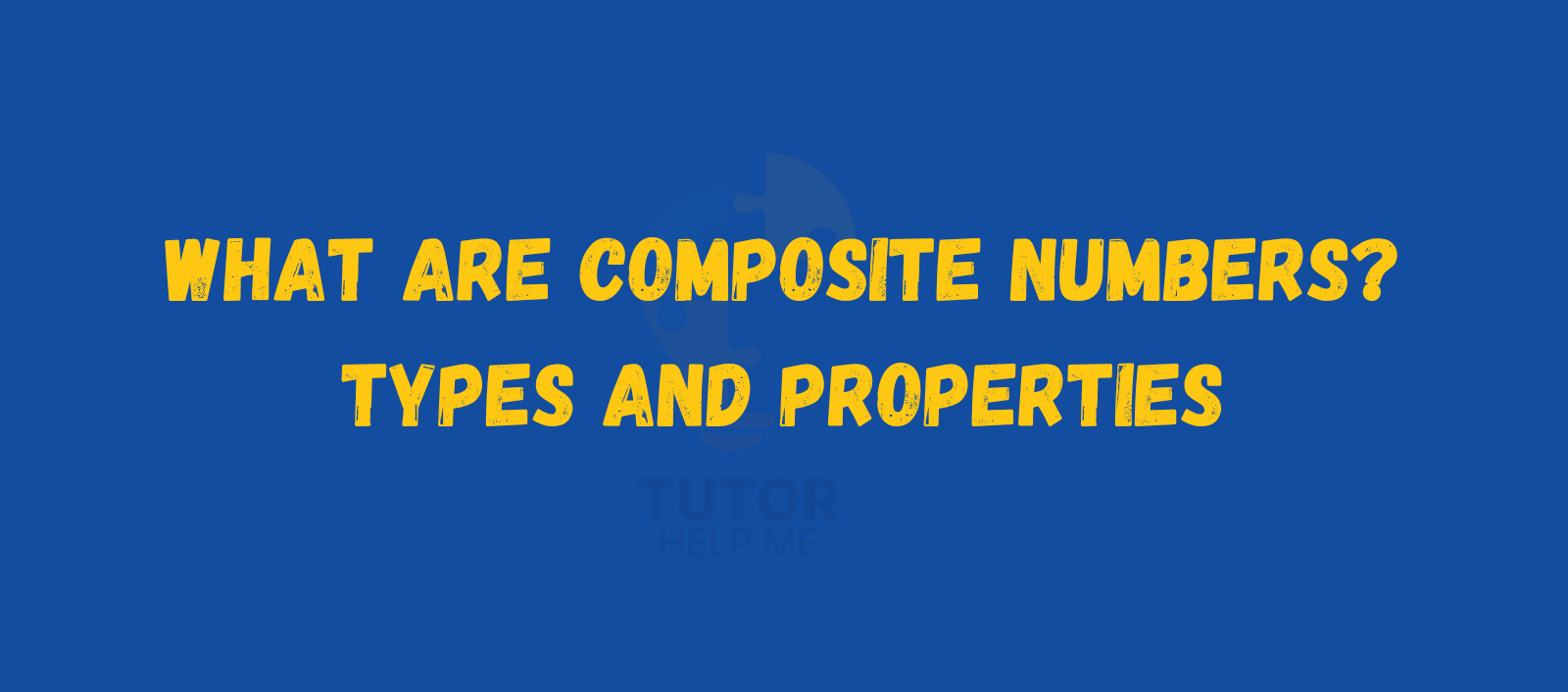Composite numbers are an important part of mathematics. They are the numbers that have more than two factors.
This guide will explain what composite numbers are, their types, properties, and how to find them with examples. By the end, you will have a clear understanding of composite numbers and their role in maths.
Let’s begin with the definition and move step by step into details.
What Are Composite Numbers?
A composite number is a whole number greater than 1 that has more than two factors.
- A composite number can be divided by 1, itself, and at least one other number.
Example:
6 is a composite number because it can be divided by 1, 2, 3, and 6.
Types of Composite Numbers
Composite numbers can be divided into categories.
1) Odd Composite Numbers
- Composite numbers that are not divisible by 2.
- Examples: 9, 15, 21, 25
2) Even Composite Numbers
- Composite numbers that are divisible by 2.
- Examples: 4, 6, 8, 10
3) Smallest Composite Number
- The smallest composite number is 4.
- Factors of 4 are 1, 2, and 4.

Properties of Composite Numbers
More than Two Factors
Composite numbers always have more than two factors. For example, 12 has factors 1, 2, 3, 4, 6, and 12, making it a composite number with multiple divisors.
Smallest Composite Number
The smallest composite number is 4. It has three factors: 1, 2, and 4. Since it can be divided evenly by more than two numbers, it is composite.
Prime Factorization
Composite numbers can be expressed as a product of prime numbers. For example, 18 = 2 × 3 × 3. Prime factorization shows how smaller prime numbers form composites.
Even Numbers
All even numbers greater than 2 are composite. For example, 8 has factors 1, 2, 4, and 8. Since it has more than two factors, it is composite.
Divisible by Others
Composite numbers can be divided evenly by numbers other than 1 and itself. For example, 15 can be divided by 3 and 5, showing it is composite.
List of First 20 Composite Numbers with Factors
| Composite Number | Factors |
|---|---|
| 4 | 1, 2, 4 |
| 6 | 1, 2, 3, 6 |
| 8 | 1, 2, 4, 8 |
| 9 | 1, 3, 9 |
| 10 | 1, 2, 5, 10 |
| 12 | 1, 2, 3, 4, 6, 12 |
| 14 | 1, 2, 7, 14 |
| 15 | 1, 3, 5, 15 |
| 16 | 1, 2, 4, 8, 16 |
| 18 | 1, 2, 3, 6, 9, 18 |
| 20 | 1, 2, 4, 5, 10, 20 |
| 21 | 1, 3, 7, 21 |
| 22 | 1, 2, 11, 22 |
| 24 | 1, 2, 3, 4, 6, 8, 12, 24 |
| 25 | 1, 5, 25 |
| 26 | 1, 2, 13, 26 |
| 27 | 1, 3, 9, 27 |
| 28 | 1, 2, 4, 7, 14, 28 |
| 30 | 1, 2, 3, 5, 6, 10, 15, 30 |
| 32 | 1, 2, 4, 8, 16, 32 |
Numbers That Are NOT Composite
Some numbers do not fall into the composite category.
1) Prime Numbers
- Numbers with only two factors: 1 and itself
- Examples: 2, 3, 5, 7, 11
2) The Number 1
- 1 has only one factor, so it is neither prime nor composite.
3) Zero
- Zero is not composite because it has infinite divisors.

How to Find Composite Numbers?
You can check if a number is composite by:
- Listing its factors
- Checking divisibility rules
- Using multiplication
Examples
- 14: Factors are 1, 2, 7, 14 → Composite
- 19: Factors are 1, 19 → Prime, not composite
- 25: Factors are 1, 5, 25 → Composite
Difference Between Prime and Composite Numbers
| Feature | Prime Numbers | Composite Numbers |
|---|---|---|
| Number of Factors | Exactly 2 | More than 2 |
| Smallest Example | 2 | 4 |
| Examples | 2, 3, 5, 7 | 4, 6, 8, 9 |
Examples of Composite Numbers
- 4 = 2 × 2
- 6 = 2 × 3
- 8 = 2 × 4
- 9 = 3 × 3
- 12 = 2 × 6
Importance of Composite Numbers in Maths
- Help in learning factorization
- Used in finding LCM and HCF
- Important in prime factorization
- Applied in algebra and number theory
Conclusion
Composite numbers are natural numbers greater than 1 that have more than two factors. They can be odd or even, with the smallest being 4.
Unlike prime numbers, which have only two factors, composite numbers have multiple divisors. Understanding their properties and rules makes it easier to work with factorization, LCM, and HCF.
By learning how to identify composite numbers, students can strengthen their foundation in number theory and problem-solving.
Read More What Are Imaginary Numbers? Formation and Operations
FAQs
Q1. What is a composite number?
A composite number is a natural number with more than two factors.
Q2. What is the smallest composite number?
The smallest composite number is 4.
Q3. Is 1 a composite number?
No, 1 is neither prime nor composite.
Q4. Are all even numbers composite?
No, 2 is an even number but also a prime number.
Q5. Is 9 a composite number?
Yes, 9 has factors 1, 3, and 9.
Q6. Is 0 a composite number?
No, 0 is not composite because it has infinite divisors.
Q7. What is the difference between prime and composite numbers?
Prime numbers have exactly two factors, while composite numbers have more than two.
Q8. Is 15 composite?
Yes, factors of 15 are 1, 3, 5, 15.
Q9. Can composite numbers be negative?
Composite numbers are usually defined for natural numbers, not negatives.
Q10. Why are composite numbers important?
They help in factorization, finding LCM, and solving number problems.

